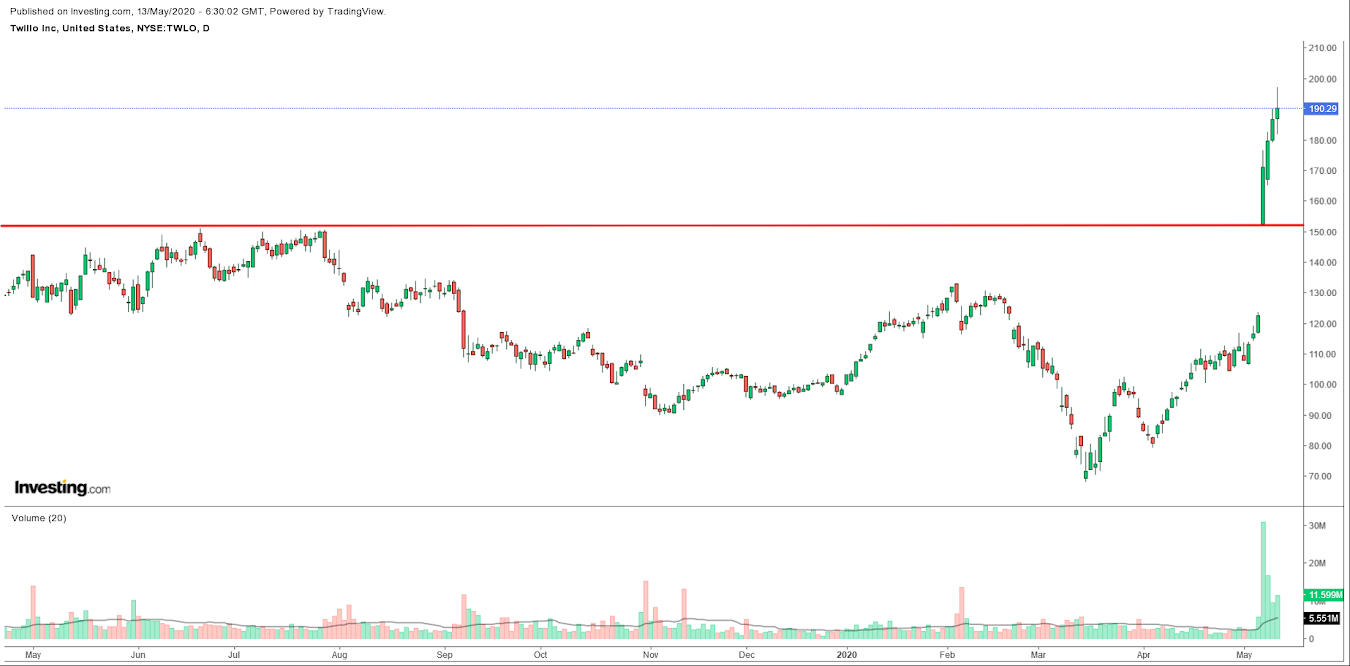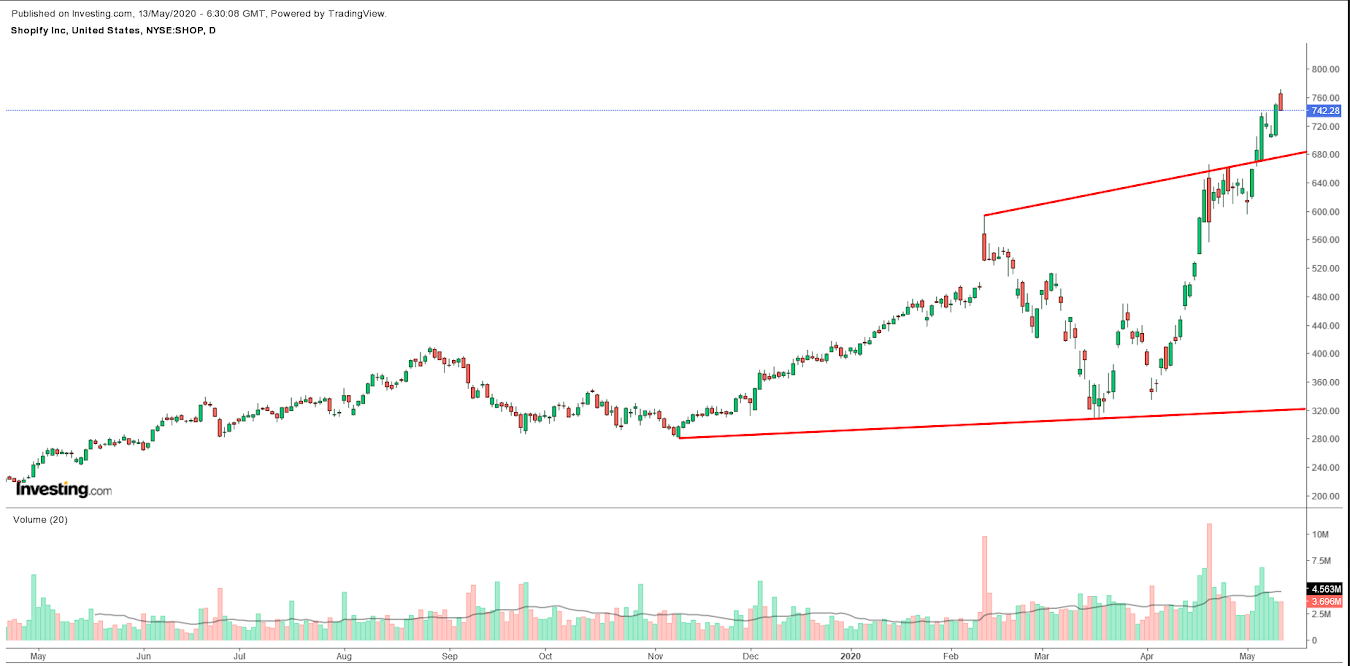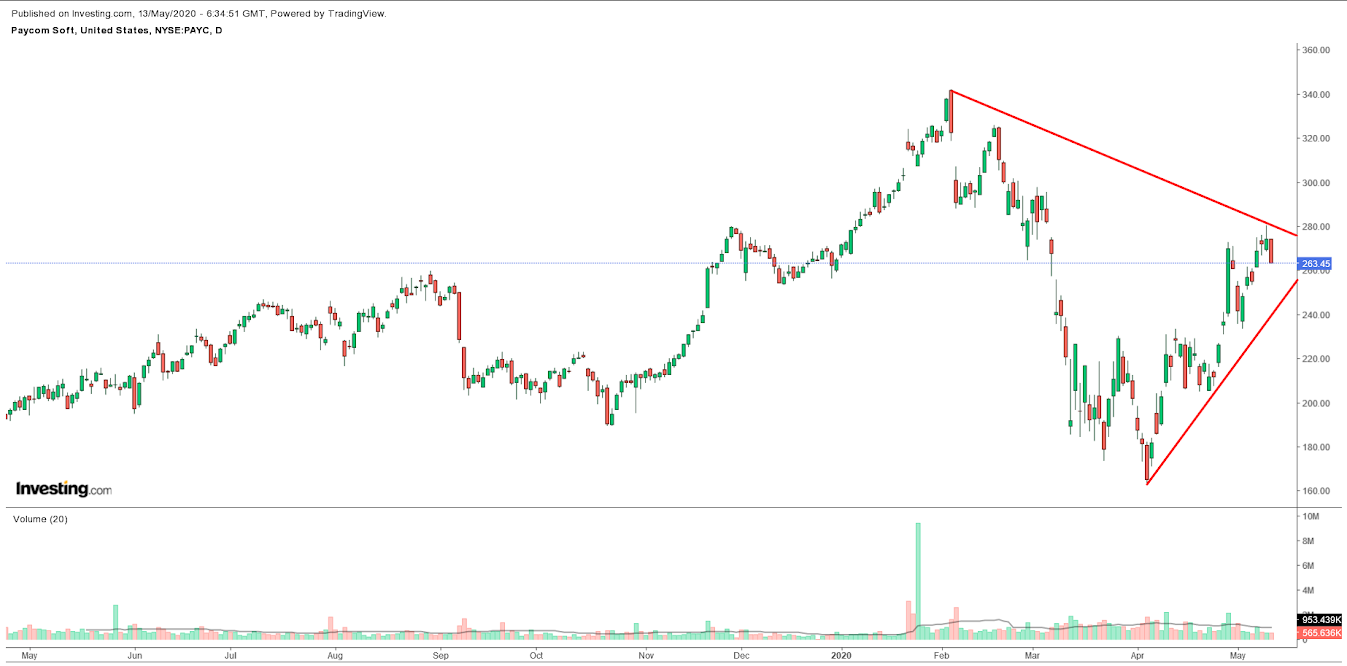Headlines surrounding the devastating coronavirus pandemic, which has so far infected over 4 million people worldwide and killed approximately 291,964, have been the primary driver of market sentiment in recent months.
A warning from top U.S. infectious disease expert Anthony Fauci that prematurely reopening the U.S. economy could lead to a second wave of coronavirus infections weighed on the markets on Tuesday, causing stocks to selloff. However, in the face of COVID-19, there have been more than a few technology companies showing signs of growth.
Below we focus on three leading names in the cloud software space, which, following their latest quarterly earnings reports, are well worth considering.
1. Twilio
Twilio (NYSE:TWLO) soared past consensus estimates for EPS and revenue when it posted fiscal first-quarter earnings on May 6. Results were boosted by increased demand for the cloud communication platform from telehealth and education companies amid widespread lockdowns due to the coronavirus.
“In many ways, Twilio was built for this moment, we offer the three things that companies need as they are accelerating their digital plans,” Twilio CEO Jeff Lawson said during the company’s post-earnings conference call.
The San Francisco-based company reported adjusted earnings per share of 6 cents, confounding expectations for a loss of 11 cents per share. Revenue rose to $364.9 million, up an impressive 57% from the same quarter a year earlier.
Since reporting earnings last week, the stock rallied a whopping 55% to an all-time high of $197.00 on Tuesday before ending at $190.29 with a market cap of roughly $26.65 billion. Shares are up 93.6% year-to-date, compared to the NASDAQ’s 0.3% annual gain.

Twilio's active customer accounts also maintained a torrid pace of growth, climbing nearly 23% year-over-year to 190,000 by the end of the quarter.
Although demand in the quarter weakened from several of its top customers, including ride-hailing firms Uber (NYSE:UBER) and LYFT (NASDAQ:LYFT), it saw increased use of its cloud-based services by call centers, education companies, healthcare and food delivery firms.
For the second quarter, Twilio’s forecast called for revenue between $365 million to $370 million, well ahead of consensus estimates for sales of just $336.9 million.
Despite robust gains so far this year, Twilio’s stock still looks attractive going forward, considering the strong demand for its cloud-based communications platform, which has made it one of the true leaders in its field.
2. Shopify
Shopify (NYSE:SHOP) reported monster first-quarter earnings and revenue figures on May 6 as demand has surged for the booming e-commerce software platform.
The company, which allows merchants to build online retail shops and manage their brands, saw new stores on the platform jump 62% between March 13 and April 24 as many brick-and-mortar businesses migrated online.
Shares of the Ottawa-based company climbed to a record high of $770.90 yesterday before settling at $742.28. The stock has gained 86% so far in 2020, giving it a market cap of $87.0 billion.

Shopify reported adjusted first-quarter EPS of 19 cents, up a whopping 111% from EPS of 9 cents in the year-ago period. Analysts were bracing for a loss of 19 cents per share. Revenue jumped 47% year-over-year to $470.0 million, which was higher than the estimated $320.5 million.
Gross merchandise volume, a key metric used in the e-commerce sector to measure transaction volumes, rose 46% to $17.4 billion, easily surpassing estimates of $16.6 billion.
"While the COVID-19 pandemic has subdued commerce globally and especially strained small and medium-sized businesses, it has accelerated the shift of purchase habits to ecommerce," Shopify said in a release.
Although Shopify did not provide any outlook on the coming quarters, we anticipate that the stock will continue to be a good bet going forward as consumers change their shopping habits in the wake of coronavirus.
3. Paycom Soft
Paycom Soft (NYSE:PAYC) continued its streak, beating analyst expectations when it reported first-quarter earnings on April 28 as the cloud-based human resource management software saw a bump in demand for its services.
Shares of the Oklahoma City-based company, which have surpassed analyst expectations for each of its quarterly reports since going public in 2014, closed at $263.45 last night. The stock has gained 11% since reporting results late last month, giving it a market cap of roughly $15.43 billion.

The workforce management software company said adjusted earnings per share were $1.33, up 12% from the first quarter of 2019. Sales rose 21% to $242.4 million, exceeding analyst expectations of $238.6 million, as new business wins and the company’s high-margin recurring revenue business drove results.
“I’m proud of our excellent first quarter results and the continued success we are having onboarding new clients,” said Paycom founder and CEO Chad Richison, who added that he views the coronavirus crisis as an opportunity to gain market share.
"The pandemic is exposing seams created by the disparate systems and that is creating a higher demand for the Paycom single database solution," Richison said in Paycom's first-quarter earnings call.
Citing uncertainty surrounding the economic and business conditions of its clients, Paycom withdrew its outlook for full-year 2020.
Despite that, we expect the company to continue to do well on the customer acquisition front as it positions itself as a leader in providing cloud-based software solutions for human resources.
